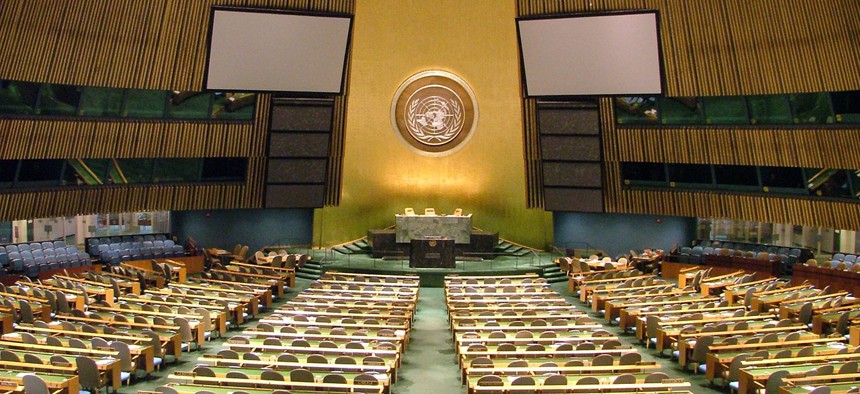
Flickr user Paul VanDerWerf
Always Stay For the After Party: Tips from the Negotiation Bible For World Leaders
Even top diplomats need guidance sometimes.
Negotiating is hard enough when your livelihood is on the line, imagine how difficult it is to negotiate when the future of the world is at stake.
Even top diplomats need guidance. To ensure that agendas are addressed and conflicts resolved, the United Nations has created its own primer for the art of negotiation, called “Intergovernmental Negotiations and Decision Making at the United Nations: A Guide.”
Written in 2003, the official guide offers wisdom on how countries and NGOs can get what they want. Much of the book offers insight into UN bureaucracy, but there is also a more strategic section on how to playdiplomatic power games (pdf, p.47).
The UN is a very big bureaucratic machine, and even the sharpest political acumen at times fails to make it move efficiently. But the UN-approved tactics below—devised to move entire countries—are pointed enough to ensure victory in smaller battlefields: the office, social negotiations, sometimes family.
Here are some of the best, diplomatic tricks for getting what you want from others:
Over-preparedness is a myth:
From a strategic perspective, it is important to determine not only how many representatives can attend the meeting, but who is the best prepared. […] It is also important to consider sending representatives to preparatory meetings that are held normally in the year or more before a major world conference, as many negotiations are well on their way to being concluded during the preparatory process for the final event.
If you’re applying UN wisdom to a job interview, for example, consider: What do you know about the company and the person interviewing you? Do you share a passion? An experience? Can you come up with something very specific about why you’d like to get the position?
If you’re asking for a raise: Do you know how much your peers make? Do you have a sense of the industry standards?
Decide what’s negotiable—and what’s not—before meeting:
It is import to establish priorities for objectives, issues, activities and resources, and to understand, generally speaking, that not everything will be achieved.
This is one of the first priorities in the UN guide to negotiation and, indeed, it should probably be step zero of any deal. Know what you want, and know everything there is to know about that. Read. Research.Find arguments that support what you are asking, and don’t waste time trying to win opponents over—people rarely change their minds.
Have a clear idea of which subjects are so politically insensitive and intractable that the potential for impact may be low. […] Advocacy efforts should be devoted to the subjects that governments are still negotiating.
Reach out—the earlier, the better:
Well in advance, begin finding out who will attend the meeting from the home government. Since UN negotiations often start many months and even years before the final meeting, making contact with the appropriate officials, both within the diplomatic team and at the national level, can be an opportunity.
Remember: It’s the friends you make when you don’t need them that will help you out when you do.
The UN recommends getting in touch with key people even years ahead of time. Make friends with the person who has the job you now want, the person who might one day give you the job of your dreams, your neighbor who will let you rent out your co-op apartment in New York City. Don’t only link up with those who hold the key to what you want—make allies in their networks.
Be generous to everyone…
Networking and information-sharing in general can maximize both impact and resources
Being generous works in your self-interest. Offer as much help as you can, and connect the good people you know: this makes you a reference point, a human hub of sorts. A lot of things in life are quid pro quo—you can’t get much without giving something.
…but come armed
Bring copies of position papers, in multiple UN languages if possible; materials about the organization; business cards; extra letterhead; and other office supplies that may be needed. Bringing electronic equipment—such as a mobile phone or portable laptop and printer—may also prove to be useful.
Whatever it is—bring it, just in case. A copy of your résumé. An iPad with that project you worked on that looked so great. Information about the potential new tenant of that co-op of yours. (While the UN recommends to “bring copies,” in the real world one copy—two at most—is usually fine.)
Have only three points
It is critical to know the most important priority issue in advance, and focus the message clearly and concisely to support it. […] Come up with no more than three key points. State them clearly and concisely, and support them with facts, figures or anecdotes that will grab attention. Make concrete proposals.
Be short. Be clear. Don’t try and achieve too much, because one small success is better than several big attempts.
Always stay for the afterparty
Much of the interaction between governments and NGOs takes place immediately before or after a negotiating session, when delegates are free to talk and tend to mingle on the floor of the negotiating room. In order to distinguish who is from which government, delegates sit behind their country nameplates during the session. Social functions, such as receptions and lunches, provide other chances for informal discussion.
Lenny Kravitz would sum this up as “it ain’t over ’til it’s over.” What happens before a meeting will set up the tone of the conversation. What happens after will determine how people feel about its result—push before, and guard your progress after.
Follow up
UN agreements are only the first step in the process of achieving the aims that they express. Their central importance lies in follow-up at the national level. Many agreements contain references to establishing follow-up mechanisms, methods of evaluating implementation, and sources of funding. It is primarily the responsibility of national governments and international organizations to use these tools to transform commitments and obligations into reality.
This is not only true of international agreements—but about pretty much every decision ever made, from getting up earlier in the morning to responding to a marriage proposal with a “yes.” Just because you said it’ll happen, doesn’t mean it will.
So, make the follow-up plan part of the agreement itself. A good trick is to set an execution schedule or a deadline for everyone involved in the decision. If you didn’t get your raise by the day you were supposed to, make sure you create an occasion to understand why that didn’t happen.
(Image via Flickr user Paul VanDerWerf)







